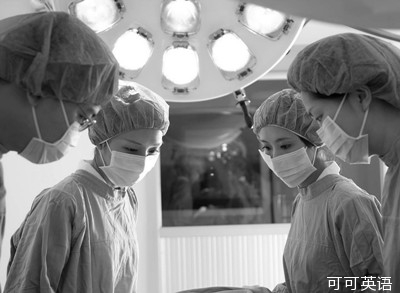Surgeons call them "never events,” because they are supposed to never happen: things like leaving a piece of equipment in someone or removing the wrong body part. But despite major efforts to reduce medical errors, these “never events” still occur more than 4,000 times each year in the U.S. That finding is in the journal Surgery.
像在某人身体里留下一块设备,或者移除了不对的身体部位这类事情,外科医生称之为“决不该发生的事”,因为它们本就不应该发生。但即使作出重大努力来减少医疗错误,每年仍然有4000余起“决不该发生的事”发生在美国。这项发现发表在外科学杂志上。

Researchers sifted through thousands of malpractice claims. They found surgeons leave a foreign object inside at least 39 patients each week. And wrong procedures or incorrect site surgeries each occur 20 or more times per week.
研究人员筛选了几千例医疗事故索赔案,发现外科医生每周至少在39位病人体内留下异物。每周会有超过20次的手术发生操作步骤错误或者手术位置错误。
Such incidents are obviously preventable. Checklists and equipment counts are supposed to take place in the operating room. Even if you're comatose when going under the knife, you can have a conversation with your doctor beforehand to make sure everyone knows what operation is scheduled. And feel free to ask for a permanent marker drawing on your body. So that the surgeon is greeted with an inked note that says something clear, such as, “Take Out T his Kidney.”
很明显,这类事故是可以避免的。在手术室应该备有清单,手术设备也应该清点清楚。即使在手术刀下昏迷着,你也可以在手术前与医生交谈,确保每个人都知道手术操作进程。放心地去要求医生用记号笔在你身上画记号。这样医生才会时刻提醒自己注意到某些事,例如可以写上“从我肾脏中取走T”。
来源:可可英语 //www.utensil-race.com/broadcast/201301/220683.shtml












